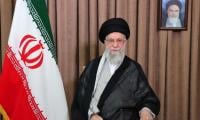The right to vote
In Sing Sing, one of New York state’s oldest prisons and currently home to more than 1,000 men (myself included), the presidential election was an exciting time.
Throughout Election Day, many of us could be heard passionately contemplating the chances of our preferred candidate. Most looked forward to seeing 45—a.k.a. Trump—lose in spectacular fashion while his few supporters voiced optimism. Several men could be heard over the phone imploring family members to vote or asking officers and staff members who they intended to vote for.
By 6 p.m., the large gallery television was tuned to CNN, where Wolf Blitzer and John King presented vote counts on the ‘Magic Wall’. As the hours went on, so too did the comments: “I feel like I'm watching the Superbowl”. “I feel like I'm waiting for a parole decision”.
After we returned to our cells for the night, we watched on our personal TVs, and called out the results. One of my neighbors yelled “I feel so nervous!” It reminded me of another event I watched on TV from a cell just months earlier: the funeral service for Congressman John Lewis in Atlanta. I could not help but feel the call to action, the call to vote. What could be a more fitting tribute to a man who nearly lost his life protesting for the right of Black people to vote than exercising that very right – especially when the loudest voice from the world's most powerful office shouts for us to be silent?
Unfortunately, as an incarcerated person, I am acutely aware of my own marginalized status. I represent a segment of the population that has actively been denied the right to exercise the franchise. As the civil rights icon was honored, I thought about the nearly six million people who continue to be disenfranchised, including the formerly incarcerated.
Indeed, at the founding of this country, voting was largely the province of wealthy white landowners. In 1821, Massachusetts alone allowed universal male suffrage. It would not be until 1870, when the 15th Amendment to the Constitution was ratified, that restrictions to voting on the basis of “race, color, or previous condition of servitude” were prohibited.
That was quickly followed by backlash – part of the pattern of advancement and retrenchment that continues to characterize the political and social landscape of America. After the 15th Amendment, the Black electorate was confronted with poll taxes, absurd literacy tests, and outright domestic terrorism, all designed to suppress their votes.
In 1965, the Voting Rights Act was enacted, thanks in no small part to John Lewis, to contend with this suppression. It worked as intended until the US Supreme Court’s 2013 Shelby County v. Holder decision curtailed oversight of states known to actively produce roadblocks to voting, especially for Black people.
Excerpted: ‘Let Everybody Vote, Even If They're Incarcerated’
Commondreams.org
-
 Shia LaBeouf Arrested Again In New Orleans On Additional Battery Charge
Shia LaBeouf Arrested Again In New Orleans On Additional Battery Charge -
 Shamed Andrew Upset With THIS Family Member Over Current Condition
Shamed Andrew Upset With THIS Family Member Over Current Condition -
 Michael Jackson Estate Sued With Allegations Of Years Of Abuse From Late Singer
Michael Jackson Estate Sued With Allegations Of Years Of Abuse From Late Singer -
 Meghan Markle Shows ‘real Pain’ With Her Body Language In Jordan
Meghan Markle Shows ‘real Pain’ With Her Body Language In Jordan -
 Jennifer Garner Names Her Movie That She Hasn't Seen In Full Since Its Premiere
Jennifer Garner Names Her Movie That She Hasn't Seen In Full Since Its Premiere -
 Bridgerton’s Michelle Mao On Facing Backlash As Season Four Antagonist
Bridgerton’s Michelle Mao On Facing Backlash As Season Four Antagonist -
 King Charles Gets New ‘secret Weapon’ After Andrew Messes Up
King Charles Gets New ‘secret Weapon’ After Andrew Messes Up -
 Shia LaBeouf Makes Bold Claim About Homosexuals In First Interview After Mardi Gras Arrest
Shia LaBeouf Makes Bold Claim About Homosexuals In First Interview After Mardi Gras Arrest -
 Princess Beatrice, Eugenie ‘strained’ As They Are ‘not Turning Back’ On Andrew
Princess Beatrice, Eugenie ‘strained’ As They Are ‘not Turning Back’ On Andrew -
 Benny Blanco Addresses ‘dirty Feet’ Backlash After Podcast Moment Sparks Online Frenzy
Benny Blanco Addresses ‘dirty Feet’ Backlash After Podcast Moment Sparks Online Frenzy -
 Sarah Ferguson Unusual Trait That Confused Royal Expert
Sarah Ferguson Unusual Trait That Confused Royal Expert -
 Prince William, Kate Middleton Left Sarah Ferguson Feeling 'worthless'
Prince William, Kate Middleton Left Sarah Ferguson Feeling 'worthless' -
 Ben Affleck Focused On 'real Prize,' Stability After Jennifer Garner Speaks About Co Parenting Mechanics
Ben Affleck Focused On 'real Prize,' Stability After Jennifer Garner Speaks About Co Parenting Mechanics -
 Luke Grimes Reveals Hilarious Reason His Baby Can't Stop Laughing At Him
Luke Grimes Reveals Hilarious Reason His Baby Can't Stop Laughing At Him -
 Why Kate Middleton, Prince William Opt For ‘show Stopping Style’
Why Kate Middleton, Prince William Opt For ‘show Stopping Style’ -
 Here's Why Leonardo DiCaprio Will Not Attend This Year's 'Actors Award' Despite Major Nomination
Here's Why Leonardo DiCaprio Will Not Attend This Year's 'Actors Award' Despite Major Nomination



